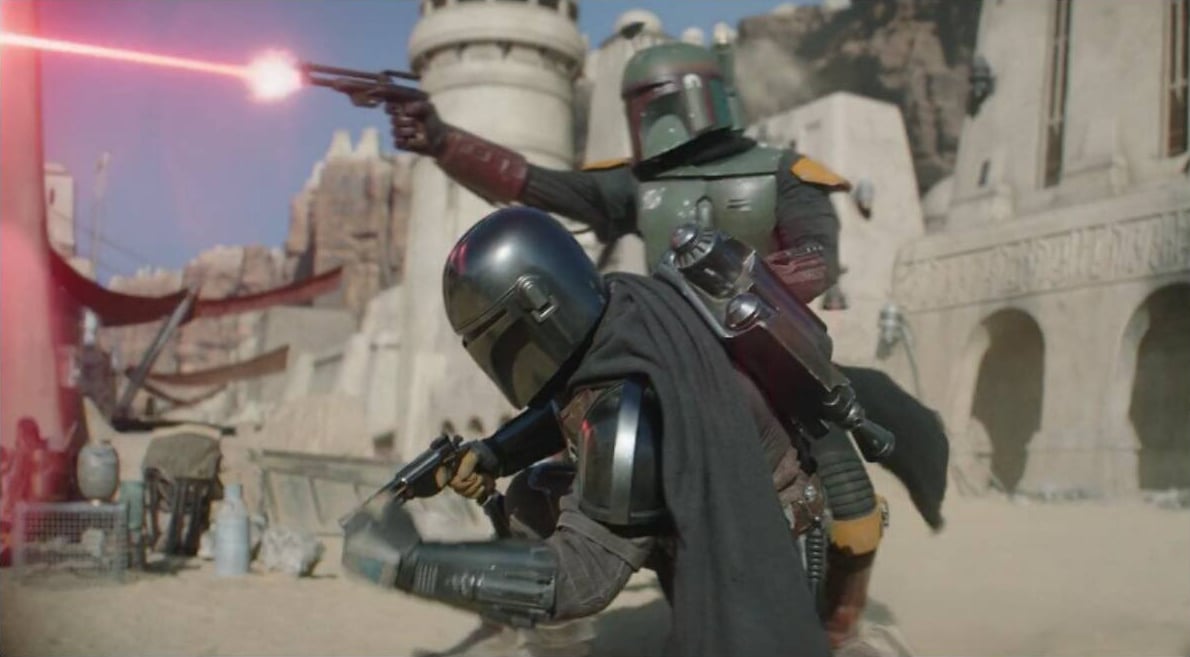This discussion and review contains spoilers for The Book of Boba Fett episode 7, “In the Name of Honor.”
Perhaps the best that can be said about “In the Name of Honor” is that it looks expensive and that – unlike both “Return of the Mandalorian” and “From the Desert Comes a Stranger” – it actually feels like an episode of a show called The Book of Boba Fett.
“In the Name of Honor” is full of bombast and spectacle. The special effects are impressive. While the action isn’t particularly well directed or choreographed, it is certainly present. More than any previous episode of The Mandalorian or The Book of Boba Fett, “In the Name of Honor” is clearly aspiring to be blockbuster television. It is an episode built around big set pieces and massive carnage. However, it all feels curiously empty.
Part of this is undoubtedly down to the fact that “In the Name of Honor” is effectively paying off a narrative that The Book of Boba Fett hasn’t been especially interested in for about three weeks. The episode opens in the aftermath of the bombing at the end of “From the Desert Comes a Stranger.” Surveying the ruins, Boba Fett (Temuera Morrison) observes, “We’re at war.” Fennec Shand (Ming-Na Wen) replies, “It was inevitable.”
This is technically true. The earlier episodes of the season seeded the inevitable conflict between Fett and the Pyke Syndicate. However, they never seemed particularly interested in that. The Pykes have never been well-developed as antagonists. The opening episodes of the season featured the red herring introduction of the Hutt Twins as potential adversaries, while the second half of the season was more interested in tying into The Mandalorian.

As a result, “In the Name of Honor” has to do a lot of heavy lifting, and a lot of telling rather than showing, to establish the Pyke Syndicate as an enemy that can anchor a season finale of The Book of Boba Fett. This is most obvious in how clumsily “In the Name of Honor” handles the revelation that the Pyke Syndicate murdered the Tusken Raiders. It is an obvious twist, and one necessary for the season to work, but the execution is incredibly clunky.
The Pyke Syndicate helpfully exposit their nefariousness to Cad Bane (Corey Burton), a secondary antagonist who only entered the narrative in the previous episode. They also helpfully explain why this revelation carries no weight, telling Bane that Fett doesn’t even suspect that they killed his adoptive family. “In his mind, the matter is resolved,” they boast. Fett only learns about this at the climax of the episode, indirectly from Bane himself.
When Fett boasts about needing to confront the Pyke Syndicate, Bane offers this bullet-point summary of the show’s emotional arc, “You mean the one that massacred your Tusken family and blamed it on a speed bike gang? You know it’s true.” This is the sum total of Boba Fett’s emotional journey concerning the death of his surrogate family. Notably, the episode delegates the settling of the score to Shand, rather than treating it as payoff to Fett’s emotional arc.
This is The Book of Boba Fett in a nutshell. It is a show that sacrifices any emotional or character arc for a transparent reference to that thing that character said that time. As the closing credits roll on “In the Name of Honor,” the most substantive character beat given to supporting character Skad (Jordan Bolger) is to complain about the award given to Krrsantan (Carey Jones), “So the Wookiee gets a melon, and we don’t?” This closing line of the show is itself a tired and obvious in-joke about the closing scene of Star Wars, in which another Wookiee was the only character not to get a medal.

“In the Name of Honor” feels like watching a particularly unimaginative child play with their action figures. There are lots of cool poses and slow motion, but not substantive emotional or character arcs. It’s all sound and fury, signifying nothing. It’s a collection of “big” moments from a show that has been either unwilling or unable to put in the work to make these moments land, because that would require actual emotional investment and narrative ambition.
This is most obvious in how bloodless the episode is. Not in a literal sense, in that Disney+ is still a streaming service aimed at children. However, it is clear that none of the major good guys are in any real danger. “I have to confess, I thought you were gone,” Fett tells Krrsantan at one point, clearly unaware that the Wookiee is too valuable a piece of intellectual property to kill off. The episode’s post-credits scene reveals what everyone already knew: Cobb Vanth (Timothy Olyphant) lives.
The most significant casualties of the battle of Mos Espa are Cad Bane and the two Gamorreans. The Gamorreans are largely interchangeable. (Which of Jabba’s guards were they?) Bane is the most prominent humanoid antagonist during the climax, so his death was basically mandated by the narrative. Even then, given the character’s popularity, it is interesting to wonder how long Disney will allow the character to remain dead before revealing that he somehow survived.
“In the Name of Honor” bungles the few emotional payoffs that it has. As in “From the Desert Comes a Stranger,” it seems like Bane wandered in from a different and much more compelling show. “You gave it a shot,” he monologues to Fett. “You tried to go straight, but you’ve got your father’s blood pumping through veins. You’re a killer.” That is a worthwhile character arc for Fett. It’s a shame that The Book of Boba Fett has never actually been interested in that character arc.

Similarly, the episode fumbles the resolution to the climactic confrontation between Fett and Bane. “Consider this my final lesson: look out for yourself,” Bane taunts Fett. “Anything else is weakness.” This lines up neatly with the show’s themes, particularly Fett’s assertion that there is strength in numbers. So, the logical follow-up to that beat would be for Fett’s allies to come to his aid and prove that Bane’s argument is wrong. Instead, Fett just… kills Bane himself, because he’s a badass.
In many ways, The Book of Boba Fett feels more like the shadow or ghost of a story than a functional narrative. The climax of “In the Name of Honor” finds Fett retreating from battle to seek assistance. He returns, riding the rancor. Strictly speaking, this was dutifully set up in “The Streets of Mos Espa.” In that episode, Fett said that he would like to ride the rancor. In this episode, Fett rides the rancor. That is, at least on paper, setup and payoff.
Of course, there’s no actual emotional weight to that setup and payoff because Fett simply said something four episodes earlier and it happened in the finale. That moment might have been more powerful had the audience seen Fett bonding with the rancor, struggling to earn its trust, trying and failing to ride it. Elements like that might have added some suspense and emotional stakes to the rancor’s return in “In the Name of Honor.” Will the rancor stand by Fett in his moment of need?

Instead, the return of the rancor is treated as a “gotcha” moment, intended to catch audience members who just watched two episodes of The Mandalorian off-guard and to flatter those viewers who spotted the few lines of foreshadowing. It’s not an emotional or character beat; it’s an empty plot point. In some ways, it feels like the culmination of larger trends in media that reduce stories to simple algorithms, empty “if… then…” statements rather than actual narratives.
The most satisfying emotional payoff in “In the Name of Honor” is tied into another show. The reunion of Din Djarin (Pedro Pascal) and Grogu is undeniably charming, even if it probably belongs in The Mandalorian. It’s also notable that this emotional beat is largely a negation of the emotional and character arcs of the first two seasons of The Mandalorian, to restore fan-favorite status quo, and it doesn’t even happen in The Mandalorian itself. It’s all content soup.
“In the Name of Honor” closes The Book of Boba Fett in a manner that is once frustrating and consistent. In the end, what should have been enjoyable pulp feels instead like something that should have just been pulped.






Published: Feb 9, 2022 01:15 pm